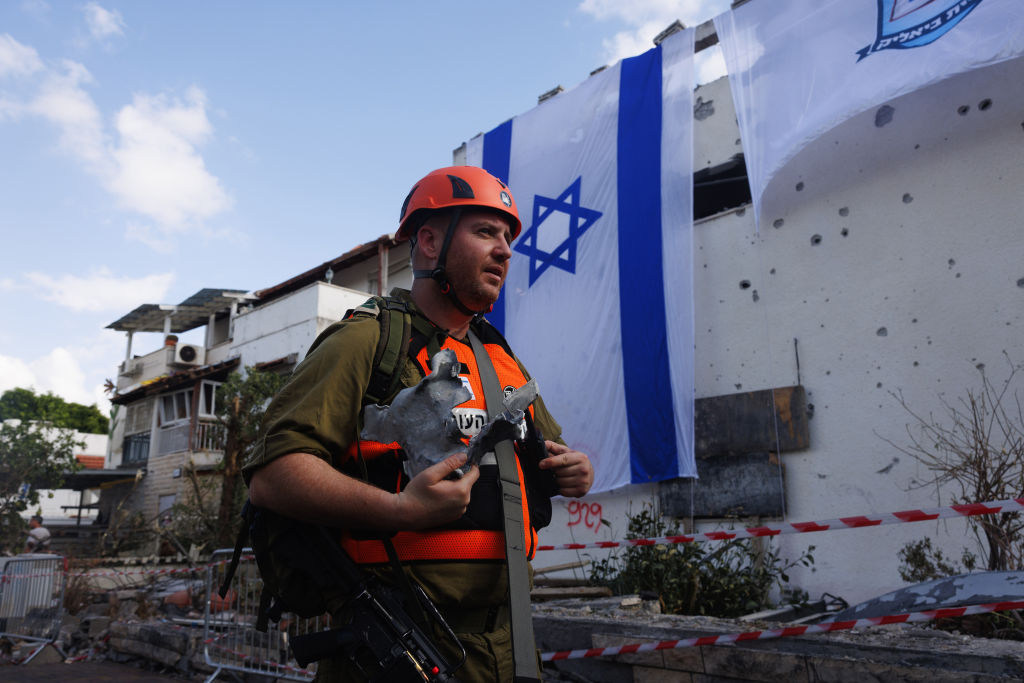Is Israel’s alleged cyber attack against Hezbollah, IRGC targets a prelude to wide-scale military op?
'It was feared some operatives were aware the batteries in their pagers were heating up unusually. Israel, fearing an operation which had been the result of significant investment in time and extensive effort, was simply forced into a situation where they had to use it or lose it'



JERUSALEM – After another extraordinary day in the Middle East, in which all manner of electronic devices – including walkie-talkies and radios – exploded in the hands of Hezbollah terrorists and Islamic Republic Guard Corps operatives in Lebanon, there are still a number of unanswered questions.
Unconfirmed reports earlier Wednesday put the number of IRGC operatives killed in these explosions at 19, with some 150 more wounded.
Israel believes that the exploding communications devices (who figured I’d ever write that) over the last two days in Lebanon is much higher than the official numbers released so far.
According to @ronenbergman “The estimation is that there are many dozens of dead, if not more”…
— Aviva Klompas (@AvivaKlompas) September 18, 2024
If this is indeed an Israeli Mossad operation (which certainly seems the most likely), what – other than immediate expedience – is the purpose of this operation, and is it a prelude to a full-scale war to push Hezbollah back away from Israel’s border with Lebanon?
It might be useful to deal with the issue of expedience, because it may help with both the timeline and the rationale behind this ingenious offensive. Reports surfaced Wednesday that Israel was somewhat forced into the action it has presumably taken over the last 30 hours or so, because the mission was in danger of being compromised. Let’s be clear, the lead-time for such an operation is at least in the several month time-frame, perhaps even up to a year.
It was feared some Hezbollah operatives were aware the batteries in their pagers were heating up unusually, and they began to report it to higher-ups. Israel, fearing an operation which had been the result of significant investment in time and extensive effort, was simply forced into a situation where they had to “use it or lose it.”
This brings us to a follow-up question of whether this action was intended to be immediately followed by airstrikes and a potential invasion of Lebanon to push Hezbollah away from the border fence, and at least as far as the Litani River.
In an important side note, one of the key facets of U.N. Resolution 1701, which ended the 2006 Second Lebanon War, was the fact the area south of the Litani River was supposed to be a demilitarized zone, policed by United Nations International Force in Lebanon, or UNIFIL, peacekeepers. This has not happened, with Hezbollah enjoying free reign in its southern Lebanon stronghold.

A clue as to whether or not the cyber attack was intended to be a constituent part of a much broader campaign can be extrapolated from what political and military leaders have been saying over the last few days.
At a meeting Monday with his United States counterpart Secretary of Defense Lloyd Austin, Israel’s Defense Minister Yoav Gallant said the “window for a diplomatic resolution in the North is closing.”
He also affirmed Israel’s determination to return the tens of thousands of internally displaced citizens from the north back to their homes. A day earlier, Israel’s Prime Minister Benjamin Netanyahu said the situation on Israel’s border “cannot continue,” adding “a change in the balance of forces on our northern border” was required.
Last week, former war cabinet member Benny Gantz, a political opponent and rival of Netanyahu’s exclaimed Israel must shift its focus from the fighting in the south against Hamas in Gaza to the northern arena and deal with the Hezbollah threat. Tangible evidence of the pivot away from Gaza to Lebanon can be seen in the deployment of the IDF’s 98th division near to the border, in the event the tensions with Hezbollah boil over.
Also from a strategic point of view – albeit Israel’s strongest suit seems to be in the realm of the tactical – what was the ultimate goal of these operations, if they were not intended to be used in conjunction with military strikes to attack the Islamist enemy while they were down, hurting, and discombobulated?
Will Israel reap the whirlwind?
It’s a truism Iran and its proxies, including Hezbollah, will not take this abject humiliation lying down. We should also recall, Iran has not officially taken revenge for an earlier indignity, namely the elimination of Hamas’ chief political operator Ismail Haniyeh at an IRGC-run complex at the end of July.
Indeed, Hezbollah fired a number of rockets at Israel, and in the early hours of the morning, a drone, whose starting point was tracked from Iraq was shot toward Tiberias on the banks of the Sea of Galilee, causing incoming rocket alert sirens to blare.
There can be no doubt Iran and its proxies will want to exact heavy retribution for these attacks, although for organizations who crave discipline and order, these attacks have sown dysfunction and chaos. While it is not clear how senior the people who were allegedly killed and wounded are, one must assume there is an urgent assessment taking place – up to and including the Islamic Republic’s government in Tehran – as to just how deep the infiltration runs.
Iran will desperately wish to retaliate, but the urgency with which it would want to do this will likely be tempered by just not being sure who can be trusted at the moment.
‘Crazy’: Watch 2nd wave of booby-trapped communications devices hit Hezbollah
Originally Published at Daily Wire, World Net Daily, or The Blaze
What's Your Reaction?
































































































